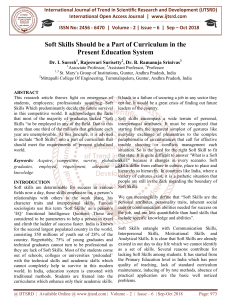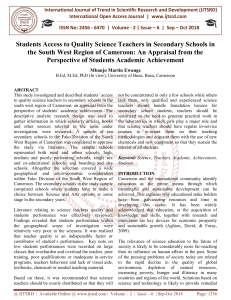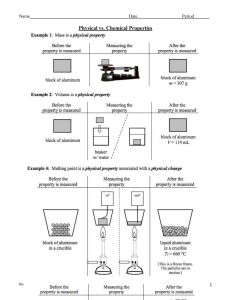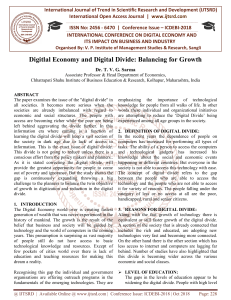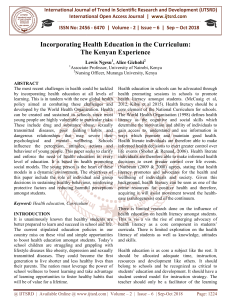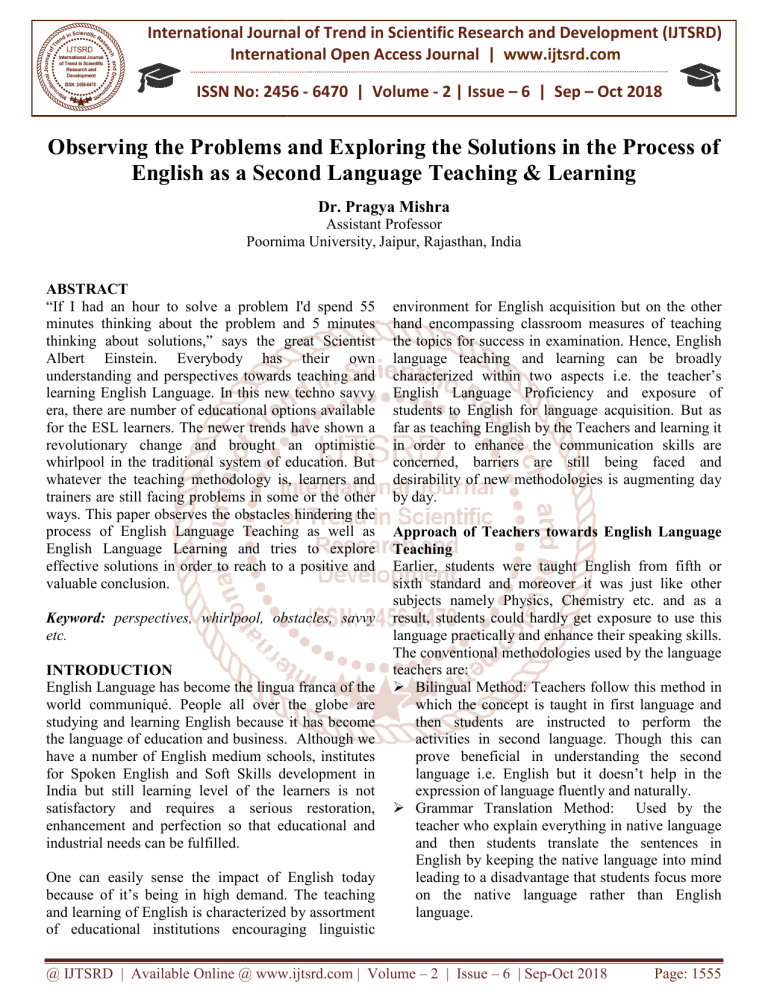
International Journal of Trend in Scientific Research and Development (IJTSRD)
International Open Access Journal | www.ijtsrd.com
ISSN No: 2456 - 6470 | Volume - 2 | Issue – 6 | Sep – Oct 2018
Observing the Problems and Exploring the Solutions in the Process
P
of
English as a Second Language Teaching & Learning
Dr. Pragya Mishra
Assistant Professor
Poornima University, Jaipur, Rajasthan, India
ABSTRACT
“If I had an hour to solve a problem I'd spend 55
minutes thinking about the problem and 5 minutes
thinking about solutions,” says the great Scientist
Albert Einstein. Everybody has their own
understanding and perspectives towards teaching and
learning English Language. In this new techno savvy
era, there are number of educational options available
for the ESL learners. The newer trends have shown a
revolutionary change and broughtt an optimistic
whirlpool in the traditional system of education. But
whatever the teaching methodology is, learners and
trainers are still facing problems in some or the other
ways. This paper observes the obstacles hindering the
process of English Language
ge Teaching as well as
English Language Learning and tries to explore
effective solutions in order to reach to a positive and
valuable conclusion.
Keyword: perspectives, whirlpool, obstacles, savvy
etc.
INTRODUCTION
English Language has become the lingua franca of the
world communiqué. People all over the globe are
studying and learning English because it has become
the language of education and business. Although we
have a number of English medium schools, institute
institutes
for Spoken English and Soft Skills development in
India but still learning level of the learners is not
satisfactory and requires a serious restoration,
enhancement and perfection so that educational and
industrial needs can be fulfilled.
One can easilyy sense the impact of English today
because of it’s being in high demand. The teaching
and learning of English is characterized by assortment
of educational institutions encouraging linguistic
environment for English acquisition but on the other
hand encompassing
ompassing classroom measures of teaching
the topics for success in examination. Hence, English
language teaching and learning can be broadly
characterized within two aspects i.e. the teacher’s
English Language Proficiency and exposure of
students to English
h for language acquisition. But as
far as teaching English by the Teachers and learning it
in order to enhance the communication skills are
concerned, barriers are still being faced and
desirability of new methodologies is augmenting day
by day.
Approach
h of Teachers towards English Language
Teaching
Earlier, students were taught English from fifth or
sixth standard and moreover it was just like other
subjects namely Physics, Chemistry etc. and as a
result, students could hardly get exposure to use this
language
anguage practically and enhance their speaking skills.
The conventional methodologies used by the language
teachers are:
Bilingual Method: Teachers follow this method in
which the concept is taught in first language and
then students are instructed to perform
perf
the
activities in second language. Though this can
prove beneficial in understanding the second
language i.e. English but it doesn’t help in the
expression of language fluently and naturally.
Grammar Translation Method: Used by the
teacher who explain everything in native language
and then students translate the sentences in
English by keeping the native language into mind
leading to a disadvantage that students focus more
on the native language rather than English
language.
@ IJTSRD | Available Online @ www.ijtsrd.com | Volume – 2 | Issue – 6 | Sep-Oct
Oct 2018
Page: 1555
International Journal of Trend in Scientific Research and Development (IJTSRD) ISSN: 2456-6470
2456
Direct Method: This method has been into
practice in most of the private institutes where a
strict environment is made for the students to talk
only in English and to some extent it has got
success too. But still the natural attitude of
speaking English is found missing somewhere.
The students are learning English as a subject rather
than as a language and moreover a favorable and
suitable aura for learning as well as understanding the
language is not being created for them at all. Robert
Bellarmine says that “the most serious pro
problem in the
teaching of English is the appalling small quantity and
atrociously poor quality of English to which our
learners are exposed.”
Problems faced by the Teacher in ELT:
Rigid mentality of the Students: College
students who come from Hindi medium schools
start developing inferiority complex that in any
condition they won’t be able to speak English.
Peer Pressure adds fuel to the fire as the fear of
becoming a laughing stock for other because of
speaking incorrect English drags the students back
and stops them to take initiative to come forward
and
perform.
Moreover,
the
prevalent
misunderstanding amongst the students that
English is the most complicated subject sharpens
their prejudiced vision and results in poor
performance.
Learning process: As teacher tries to focus on all
the basic skills of English Communication i.e.
Listening, Speaking, Reading and Writing but
students only concentrate on passing marks. At
last, this lack of interest leads both the teacher and
the students to take English learning as
inescapable hurdle and anyhow they have to come
out of it.
Unavailability of Proper Audio--Visual Aids:
Teachers find it difficult to teach English
effectively because the aids provided for practice
are not sufficient. Some are so costly that the
colleges can only afford to buy few and as a result
every student doesn’t get the chance to use such
tools for language learning and practicing.
Absence of Creativity in the Students: Students
lack in self expression
ession and feel lethargic in finding
any possibility of creativity when it comes to
essay writing, letter writing, grammar etc. they
rely on notes provided by the teachers or ready
readymade notes available at book shops. Their critical
thinking and analytical skills remain dormant as to
throw light on this issue Tej Bahadur Sapru has
said,
What is known as a critical study of any author really
means nothing more than picking up a few telling
sentences or striking phrases from some book of
criticism without real
eal attempt at entering into the
spirit of the author or appreciating his point of view.
(17)
Problems faced by the Students in English
Language Learning:
According to researchers, the English language
learning heavily relies upon proper educational
setting, which requires reasonable arrangements of
several variables – experience and knowledge of
teachers, students’ needs and attitudes, and classroom.
In other
er words, the classroom in ELT is considered as
a social context for English language to perform and
the teacher and students are key players. When
students are asked whether they want to strengthen
their Communication skills or not in spite of the fact
that
at their medium of learning had been Hindi and they
find it bit difficult to understand English spoken in
British and American accent, the crux of their various
opinions has come out as English Language in every
aspect, Listening, Speaking, Reading and Writing
Wri
is
important because it increases the precision, accuracy
aids in proper organization of thoughts. It provides a
platform to express oneself creatively, provided one
has sound knowledge of the vocabulary and can
incorporate that knowledge along with impressive
i
quotes and various literature theories.
Moreover, when observed from students’ point of
views, it is found that there are certain but very
common issues causing serious barriers in the smooth
functioning of English language learning process. The
Th
monitored barriers are:
Crowded Classrooms: The strength of the
students remains about 50-60
50
per batch and so it
becomes quite difficult to give attention to each
and every student. Although there is a provision of
Tutorial Class but unfortunately such classes are
allotted to the subjects carrying more
m
credits than
English and of course, in any Engineering
College, the weight age of English subject is very
less and so it gets very less time i.e. 2 hours per
week.
Unsatisfactory Monitoring: The teachers in most
of the colleges find it easier to guide smart
students who are already good in English and thus
@ IJTSRD | Available Online @ www.ijtsrd.com | Volume – 2 | Issue – 6 | Sep-Oct
Oct 2018
Page: 1556
International Journal of Trend in Scientific Research and Development (IJTSRD) ISSN: 2456-6470
2456
fail to supervise those students who really need
attention. As a result, such students develop
disinterest towards English learning and the
reluctance of the students also results in the
discontinuation
ion of effective activities as they lose
confidence of speaking fluent English. A teacher
is always expected to help weak students and
guide them positively.
Lack of Motivation: Teachers give tasks but they
aren’t interesting enough to motivate the studen
students.
Apart from this, consistent encouragement from
the Teacher is very important as because of this
only students will feel enlightened and won’t
hesitate to perform.
Lack of Exposure: Students spend more time in
memorizing grammar rules, translating to aand
from one’s native language and cramming
vocabulary list without using them into a proper
sentence structure and in real life situations.
Teachers suggest books according to their own
choices but prove boring to the students.
The time schedule of the classes
lasses is also not
frequent. For proper and rigorous training,
language learning should be on regular basis.
Hence, as a result, students can strengthen only
Writing and Reading Skills in comparison to
Speaking and Listening.
Exploring the Solutions:
As it has already been mentioned that in the process
of English Language learning, the role of both
Teacher and Students is important and so it becomes
vital point to be taken under consideration that both of
them will have to understand their roles for ma
making
this effort of achieving success in Language learning,
a productive one. The ESL trainer or a teacher must
know how:
To facilitate an interactive communicative
opportunities and establish situations that
induce students to communicate in English:
The crucial role of the teacher is to keep the
communication going between all members of the
class as they perform various activities. The
teacher will have to prepare the activities taking
care of Students’ interest and then explain how
they will be carried out. It may be necessary for
the teacher to provide examples of how each
activity will be performed. Once the activity is
under way, the teacher will check on individual
groups to see if they are communicating
effectively and gives help where needed.
To participate
articipate and guide: As an alternative, the
teacher may take the role of an active participant
in each learning group and guide the students what
exactly they are supposed to do.
To be the Need Analyst: As a need analyst, the
teacher is expected to determine
deter
and respond to
students’ language needs. This engages motivating
the students to participate into the designed
activities and making them aware about what they
are doing right and wrong. Though pointing out
mistakes in the process of activity won’t be good
for the students as they may lose confidence and
feel hesitant to perform again but teacher can
make notes on errors made by the students and
plan future activities to rectify these errors and
replenish students’ needs.
To focus on the function: The teacher is
expected give emphasis on the function rather
than form of the language and keeps monitoring
the performance and provides feedback.
Methodologies that can be used in English
Language Teaching:
Modelling which is basically like confronting
anyone with a problem, striking up conversation
in a class, or being assertive. Afterward, just
debrief with the students as to what you did and
why.
Write Rehearse and Speak (WRS) is an activity
that can be very beneficial
cial for the students who
feel reluctant in speaking English at an open
platform. Teacher will provide students with
various topics based on current affairs and ask
them to write an article on any one topic of their
choice. After making corrections (if required)
req
in
their articles, they will be motivated to read their
article in front of others and they may use the
paper while doing so. Then the third stage would
be speaking on the same article without looking at
the paper. This is one of the most beneficial
beneficia
activities that help in enhancing the confidence of
the students to speak English.
Role Play: One of the best methods of preparing
teens for real life is to rehearse situations.
situations Role
playing offers them the chance to practice how to
act in a situation that is non-threatening.
non
Teacher
can come up with innovative situations based on
current scenarios let the students develop their
scripts and play the parts. At the beginning, the
students may start the role play by learning the
dialogues by heart and later
late on substitute variables
in the same core structure.
@ IJTSRD | Available Online @ www.ijtsrd.com | Volume – 2 | Issue – 6 | Sep-Oct
Oct 2018
Page: 1557
International Journal of Trend in Scientific Research and Development (IJTSRD) ISSN: 2456-6470
2456
Audio-Lingual Activities: Using Audio
Audio-visual
tools add on creating an apt environment for
English Language learning. Nowadays, every
student carries MP3 player or mobile phones and
so teacher may provide
vide students with important
English learning audios so that they can practice
them at home too.
Students listen to native
speakers and then try to imitate them. Though in
order to acquire exact native English accent, one
has to go through rigorous training
ing and practice
but just listening to English help the students to
understand the proper structure of English
Sentence and grammatical usage.
Watch & Speak: Teacher can use flash cards
showing any particular scene, person and familiar
word one by one and after a series of things,
students will have to speak something on those
pictures. This activity is very effective for
developing students’ creativity and prompt
speaking skills.
Vocabulary Games: Vocabulary knowledge is
one of the main components of Com
Communication
skills. It enables language use and vice versa.
Although one may ask “how many words are
needed to do make your English communication
strong?” so, Language teacher may come up with
frequently used English words everyday and ask
students to practice
tice them whole day in their
speech even if they talking in their native
language. Apart from this, reading books play a
significant role in enriching vocabulary
knowledge of the students. Under positive
conditions, a vocabulary size can be as follows
depending
nding on the words coverage in novels or
other books for teens:
Vocabulary
%
Density of
Size
Coverage Unknown Words
1000 words
90%
2 in every 10
2500 +
94%
2 in every 18
Proper Noun
3000 words
96%
2 in every 27
5500 words
98%
2 in every 70
Students come across plethora of vocabulary everyday
but using them appropriately is the main point for
concern and for that effective vocabulary instruction
should be given by the teacher which are
•
•
•
Definitional and contextual information about the
word.
Numerous uses
ses of the word in different
framework.
Persuading students to participate with
enthusiasm.
Using different methods like Communicative
Language Teaching, Learning by Teaching etc.
Such
methods
ignite
Cooperative
and
Collaborative learning that basically emphasizes
on students’ team spirit, encouraging inherent
motivation and enhancing self admiration etc. The
interactive learning has always supported
interactive communications and thus creates more
and more opportunities for the students to work in
groups and make English language speaking a
natural process.
Provide feedback: The most important
methodology is to always provide feedback.
Observe the student in different situations and
a
then share with him/her whatever you observed.
This will help them to know areas where they
require improvement. Both negative and positive
feedbacks are essential and also offer suggestions,
if necessary.
Hence, English Language teaching can come out to be
a fruitful effort when the students appear to possess
the attributes like
The desire to listen to the English Language
The willingness to experiment with the language.
Taking the initiative to ask questions.
Develop acumen to innovate different learning
lear
process.
Positive acceptance of error identification and
correction.
Most important, nourishing the desire To Learn.
To conclude, it can be said that Teaching or learning
English as a second Language is ecstatic and
enlightening experience if it is done less seriously --But More Sincerely. English language has taken a
place of prestige and grandeur in our country and it is
undeniable fact that generation will keep coming and
going but the colossal stature of this language will
always remain the same.
e. So we have to consider the
standard of teaching level that is, unfortunately,
deteriorating and try to find out possible ways to get
rid of all the barriers for effective and better results.
@ IJTSRD | Available Online @ www.ijtsrd.com | Volume – 2 | Issue – 6 | Sep-Oct
Oct 2018
Page: 1558
International Journal of Trend in Scientific Research and Development (IJTSRD) ISSN: 2456-6470
2456
References
1. A. Suad Ahmed, A. Lamees, "Investigating
students attitudes and preferences towards
learning English at Kuwait University"; College
Student Journal. 2009.
2. Barret, S. (2002).Overcoming Transactional
Distance as a Barrier to Effective Communication
over the Internet. International Education
Journal, 3(4),, Educational Research Conference
2002, Special Issue.
3. Best, J. W., & Khan, J. W. (2012). Research in
Education (10thed.). New Delhi: PHI Learning
Private Ltd.
4. Collins, J. (1997). Barriers to Communication in
Schools. (Presentation paper). British Educational
research
Association
Annual Conference,
University of York.
5. L. Ducate, and L. Lomicka, "Podcasting: An
effective tool for honing language students'
pronunciation," Language learning &technology;
2009.
6. M. Cluck,
luck, D. Hess, Improving student motivation
through the use of the multiple intelligences,
2003.
7. M. East, "Promoting positive attitudes towards
foreign language learning: A New Zealand
initiative";
Journal of multilingual
and
multicultural development; 2009.
200
8. S. Sharada, A study of the predictors of academic
success among high school English language
learners in one urban Tennessee School District,
Ed. D, Tennessee State University, 2009.
@ IJTSRD | Available Online @ www.ijtsrd.com | Volume – 2 | Issue – 6 | Sep-Oct
Oct 2018
Page: 1559

